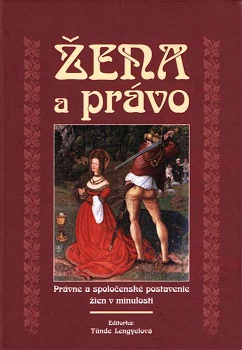Vdovy ve šlechtické společnosti raného novoveku
Noble Widows in the Early Modern Period
Author(s): Pavel Král
Subject(s): Gender Studies, Modern Age, Culture and social structure , 16th Century
Published by: Historický ústav SAV
Keywords: women; noble widows; mourning; marriage; early modern period; virginity; matrimony; widowhood;
Summary/Abstract: In concordance with her biological function and social position, the woman in the early modern period underwent three basic states - virginity, matrimony and widowhood. Medieval society had the state of virginity in high esteem; however, this status was reserved only for chosen ones. The others were to live - unless they wanted to resist Christian morality - in matrimony, which had been gaining respect especially in the teaching of Protestant theologians since the beginning of the 16th century. The most contradictory category of womanhood was widowhood. Early modern widows were subjects to broad scale of public opinions and life opportunities that ranged from those of respect and freedom to those of derision and scorn. The most relevant work devoted to the fate of women was Vidua Christiana by Erasmus of Rotterdam, who wrote it for Maria Habsburg. Jan Kherner from Pilsen translated the book into Czech in 1595 and added many valuable domestic observations of the situation. How, according to Erasmus should a decent Christian widow behave? The house of a widow should be kept clean and tidy. He also meant that it should be spiritually pure and free of worldly joys. Management of the household and estates left to a widow by her late husband was considered as one of her most important duties. Danger came in the form of various greedy and mercenary men, for who widows represented frequent and easy prey. Great stress was put on a distinctive function of clothes. Noble women wore mourning clothes usually for couple of weeks, but there were widows who were in deep mourning until the end of their lives. In the same time, also theologians of the Union of Brethren dealt with social position of widows. In their Decrees they delineated ideal conduct of widows. For example, they were to be modest, wear plain clothes and pray regularly. Brother Lucas (Lukas), one of the leading figures of the Union from the beginning of the 16th century, distinguished two types of widows. Brothers from the Union community were supposed to take care of those over sixty, who should be supported by Union common money. The younger ones were expected to take care of themselves or they marry. Generally, however, Lucas was not in favour of the second marriage. Under the burden of his tragic life, Jan Amos Comenius wrote about the sad fate of widows and widowers in his work 0 sirobe (1634). His recommendations to widows included sexual abstinence, cautiousness in choosing a new husband and if possible, not to marry again. The Czech law deals explicitly with marital gifts in the marriage contracts. A marriage contract of a future husband and wife included provisions for the wife if the man should die first. Usually, men added one third of their property. Nevertheless, although the law was clear about the marital gifts, they were repeatedly neglected. The wording of marriage contracts was reflected also in last wills of nobles. Husbands would bequeath marital gifts to their wives and often more than that. They would also allocate a house or a residence in which their wives were to live after their deaths. Often these provisions were granted to women only until the time they remarried, though sometimes even to the end of their lives. A noble widow could retain her social and material status by being appointed a legal representative of her fatherless children and an administrator of her late husbands' property. In practice, it meant that the property was at a widow's free disposal without need of authorization from the land courts. For some young widows death of their husbands was a beginning of a new life stage. For the first time in their life they became seemingly and relatively independent and free to govern their own life. Whereas it was her father, brothers or tutors who decided about her future before she married or her husband after the wedding, a widow depended only on her financial means and public opinion. The position of noble widows was rather contradictory in the early modern period. On the one hand, a widow was protected by traditional Christian morality and law clauses and on the other, she had to cope with the negative image of widowhood created by contemporary moralists on the basis of a few specific cases. Sometimes the problems of inheritance division and coexistence would push a widow even to a court trial with her late husband's relatives.
Book: Žena a právo. Právne a spoločenské postavenie žien v minulosti
- Page Range: 142-152
- Page Count: 10
- Publication Year: 2004
- Language: Czech
- Content File-PDF

